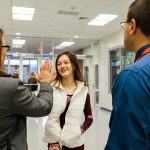“A lot of this is based on district funding, and things like that, which unfortunately tend to be so tied to the proportion of kids and families who are living in poverty,” said Sarah Woulfin, professor of education leadership at The University of Connecticut.
Schools play a critical role in fostering emotional safety for adults and students. In responding to COVID-19, schools planning to reopen must include efforts that define a safe school environment as having not only physical elements such as cleaning practices, ventilation conditions, and physical distancing protocols, but also emotional elements.
“Like monuments, mascots are not just symbols of a dark past, but barriers to a more just future. If schools and communities are to reckon with the past and present of systemic racism, and move toward a future of human rights, both monuments and mascots must fall,” says Glenn Mitoma, an assistant professor of human rights and curriculum and instruction at the University of Connecticut, and director of UConn’s Thomas J. Dodd Research Center.
“Student input is critical,” said Sandra Chafouleas, a psychology professor at the University of Connecticut’s Neag School of Education. “We can’t just assume that we know best because we are the adults.”
“That grammatical pause helps explain how racism can grow, even thrive, generations after slavery ended. It is the jump ball where the referee throws the ball slightly to one side, sometimes intentionally. It is the fastball on the edge of the strike zone where the right call is blurred so completely that bias is all that is left to decide whether it is a ball or strike,” says Doug Glanville, a faculty member in sport management at the Neag School of Education.
“To my surprise, the tweet went viral and led to my writing an op-ed in The New York Times entitled ‘I Refuse to Run a Coronavirus Home School.’ Since then, in addition to trying to keep my sanity, I have appeared on shows from ‘Good Morning America’ to ‘Central Time’ on Wisconsin Public Radio, spreading the message to parents that all we can do right now is our best and that’s enough,” says Jennie Weiner, an associate professor of educational leadership. “That we need to have self-compassion because it’s going to be messy, and to remember that educators, too, need our support and compassion as they attempt to be superhuman so we can feel a bit more human.”
Cutting across all this work is equity. Connecticut, like much of the country, is more diverse than it once was. To help ensure equal educational opportunity for all its students, UCAPP hopes to train principals to spot inequities and negotiate thorny social issues to help resolve them. It has therefore worked to infuse equity into its curriculum and create space for groups education systems often overlook.
To my surprise, the tweet went viral and led to my writing an op-ed in The New York Times entitled “I Refuse
to Run a Coronavirus Home School.” Since then, in addition to trying to keep my sanity, I have appeared on shows from “Good Morning America” to “Central Time” on Wisconsin Public Radio, spreading the message to parents that all we can do right now is our best and that’s enough.
With so many interests shaping its principal preparation program, how well is UCAPP addressing the needs of its students, who many consider UCAPP’s primary stakeholders? UCAPP connected the Wallace editorial team with four members of its class of 2021, the first class to train in the current iteration of the program, so we could seek out their views about the new program.
In the wake of the pandemic, schools have pivoted to online learning. Rachael Gabriel, associate professor of literacy education and director of Neag School of Education’s Reading and Language Arts Center, knew she wanted to help the education community amid this major shift.



